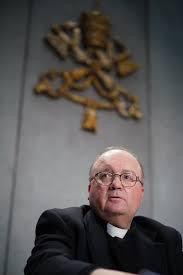|
Pope Francis’ edict to have little effect on how US priests, nuns report sex abuse
By Danae King
While a recent mandate on child sexual abuse from Pope Francis made headlines worldwide and garnered praise from Catholic leaders and some skepticism from victim advocates, not much about how abuse is reported in the United States will likely change. The new church law, which was released on May 9 and goes into effect June 1, states that all Catholic priests and nuns have to report clergy abuse of minors and adults to church authorities. However, the edict, called a Motu Proprio, gives precedent to existing local practices, said Deacon Bernie Nojadera, executive director of the Secretariat for Child and Youth Protection with the U.S. Conference of Catholic Bishops. In the United States, those practices were set by a 2002 document called the Charter for the Protection of Children and Young People that instructs clerics to report suspected abuse to local authorities first, before telling church officials, Nojadera said. “We are ahead of the curve on that,” he said of the United States’ practices. “From 2002 on, with the charter it’s been very clear that law enforcement is contacted.” The charter also established training guidelines for people in the church involved with children, including clergy members, other church officials and volunteers. And they are trained on mandated reporting laws in their state. Ohio is one of 28 states that names clergy as mandated reporters, and it’s a misdemeanor offense in the state if mandated reporters don’t report suspected child abuse to law enforcement, which could be police or children’s services agencies. Under the pope’s edict, there are no penalties for not reporting sexual abuse — of minors, sexual misconduct with adults and knowing of or covering up any abuse — to the church. Although clerics are mandatory reporters in Ohio, there are some exceptions to when they are required to report, including “privileged conversations” that take place during the Catholic sacrament of confession. Columbus Bishop Robert J. Brennan released a written statement on the mandate, praising it as a “significant step” that will provide a framework for the diocese in the future. The diocese released a list of 34 clergy members who had been “credibly accused” of child sexual abuse in its more than 150-year history in early March, shortly before Brennan succeeded Bishop Emeritus Frederick Campbell as Columbus’ 12th bishop. The most recent abuse case on the list occurred more than 25 years ago. The diocese has added two more names to the list since its release, bringing the total to 36, and diocesan officials said it is still subject to changes and revision. ″(Pope Francis’) order provides standards, expectations, and procedures that will assist the Church in addressing this worldwide problem,” Brennan said in the statement. “It affirms our current commitment to offer spiritual care for survivors and their families, to provide full compliance with all civil laws regarding reporting of allegations of sexual abuse to authorities, to uphold the right of any person to report these crimes, to guarantee prompt and objective investigations, and to assure strong lay involvement.” The mandate marks the first time universal church law states that victims cannot be ignored or prevented from speaking out and that all clerics have to abide by jurisdictional law when it comes to reporting. Nojadera praised the pope’s mandate, saying that it makes it clear that bishops are to be held accountable and should also report abuse. The law lays out new procedures to hold more-senior level church authorities, such as bishops and cardinals, accountable for committing abuse or for covering up the crimes of others. “It just reminds the bishops they are clerics as well,” Nojadera said. Further, the law provides protections to whistleblowers and requires all dioceses to have a system in place to receive the claims confidentially. Dioceses have until June 1, 2020, to create their reporting systems and show their local Vatican embassy that they are in place. The law applies retroactively, which means priests and nuns must report even old cases of abuse and will be protected for doing so. Sherryll Kraizer, director of the Denver-based Coalition for Children, said the requirements in the mandate are obvious and that clerics should already be doing those things. She suggested the Catholic Church recommend clergy also report abuse to law enforcement, as is the law in many states. The Vatican has long argued that different legal systems make a universal reporting law impossible, and that imposing one could endanger the church in places where Catholics are a persecuted minority. Kraizer called that reasoning “just a smoke screen.” “That’s just the Church coming up with an excuse to not do the right thing,” she said. “We’re not talking about people being persecuted here; we’re talking about children being victimized by the Church.” Brennan pledged in his statement to “continue to work to provide a safe and nurturing environment for all within our community — inspired by Christ and the Joy of his Gospel and consistent with our teachings and traditions, let us all pray and work together to grow a stronger Church.” Kraizer said she doesn’t have much hope that things will change much under the new edict. “The church has a history of doing nothing with (allegations of sexual abuse) except moving people somewhere else,” she said. “If it’s designed to inspire confidence, it really does not do that.”
|
.
Any original material on these pages is copyright © BishopAccountability.org 2004. Reproduce freely with attribution.
